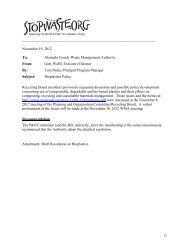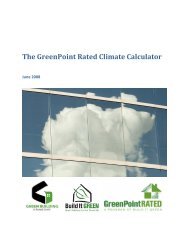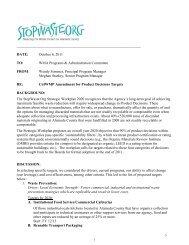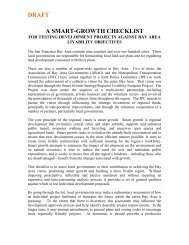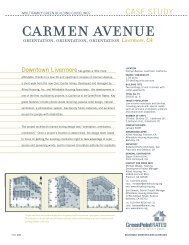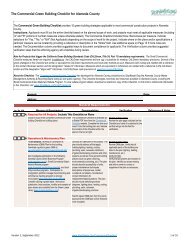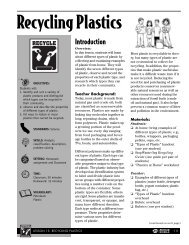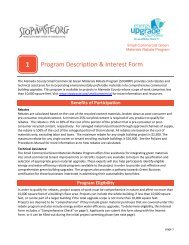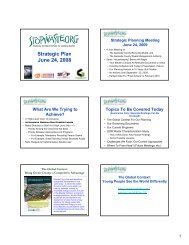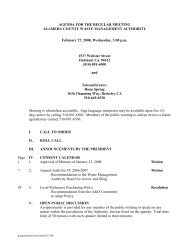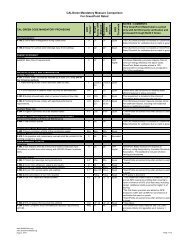Summary of Composting Survey Conducted in ... - StopWaste.org
Summary of Composting Survey Conducted in ... - StopWaste.org
Summary of Composting Survey Conducted in ... - StopWaste.org
Create successful ePaper yourself
Turn your PDF publications into a flip-book with our unique Google optimized e-Paper software.
When posed the question “Does your community have a food scrap recycl<strong>in</strong>g program, that is,the green food scrap pail and green curbside yard waste cart?,” overall, 59% <strong>of</strong> Listrespondents report that they do, and 66% <strong>of</strong> RDD respondents report that they do. The FoodScrap Recycl<strong>in</strong>g program is <strong>of</strong>fered <strong>in</strong> the majority <strong>of</strong> Cities <strong>in</strong> the County and appears to be anoption regularly employed among both samples. For the most part, awareness <strong>of</strong> the programcorresponds to the places where it is <strong>of</strong>fered.• Among both the samples, <strong>in</strong> Cities where the program exists, <strong>in</strong> excess <strong>of</strong> 2/3 <strong>of</strong> therespondents report that their community has this program.ListA majority (58%) <strong>of</strong> List respondents dispose <strong>of</strong> most <strong>of</strong> their food waste with a compost system,while the second most common method <strong>of</strong> dispos<strong>in</strong>g food waste (17%) is by food scraps pail oryard waste cart.Plant debris/yard waste is currently more commonly disposed <strong>of</strong> by yard waste cart (52%) thanby compost<strong>in</strong>g system (37%).Respondents were asked how they disposed <strong>of</strong> particular items most <strong>of</strong>ten, and it is clear that Listrespondents are compost<strong>in</strong>g all <strong>of</strong> the th<strong>in</strong>gs that they could be compost<strong>in</strong>g most <strong>of</strong> the time.The most commonly composted products are fruit and vegetable trimm<strong>in</strong>gs (52%) while plantdebris, leaves, and grass clipp<strong>in</strong>gs are typically either be<strong>in</strong>g composted or put <strong>in</strong>to a food scrapspail/yard waste cart. Meat (51%) and pet waste (45%), as would probably be expected, are theproducts most commonly disposed <strong>of</strong> <strong>in</strong> the trash can. The rema<strong>in</strong>der <strong>of</strong> the meat is disposed <strong>of</strong>through other avenues such as the garbage disposal or food scraps pail (10% each), and 5% <strong>of</strong>List respondents report they do not dispose <strong>of</strong> meat. Pet waste is disposed <strong>of</strong> to a lesser extentthrough other avenues, but 38% <strong>of</strong> list respondents report that pet waste is not someth<strong>in</strong>g theyneed to dispose.RDDMore than a third (34%) <strong>of</strong> food waste disposed <strong>of</strong> by RDD respondents goes straight to thegarbage while 27% is placed <strong>in</strong> a food scraps pail/yard waste cart. Only 14% <strong>of</strong> RDDrespondents compost most <strong>of</strong> their food waste.Seventy percent (70%) <strong>of</strong> RDD respondents dispose <strong>of</strong> plant debris/yard waste <strong>in</strong> their yardwaste cart, while 9% put plant debris/yard waste <strong>in</strong> the garbage, and another 9% compost plantdebris/yard waste.S<strong>in</strong>ce respondents were asked how they disposed <strong>of</strong> particular items most <strong>of</strong>ten, this could meanthat overall compost<strong>in</strong>g is underreported for each item, as items may <strong>of</strong>ten end up <strong>in</strong> thecompost, though not the majority <strong>of</strong> the time. Plant debris (54%), grass clipp<strong>in</strong>gs (52%), andleaves (51%) are the products most commonly disposed <strong>of</strong> by food scraps pail/yard waste cart.Most food products (meat (45%), bread products (44%), left-over meals (41%), and dairyproducts (36%)) are most commonly disposed <strong>of</strong> <strong>in</strong> the trash can by RDD respondents, and 39%Page 7ACWMAEMC 05-3307<strong>Compost<strong>in</strong>g</strong> <strong>Survey</strong> <strong>Summary</strong> (Draft)




